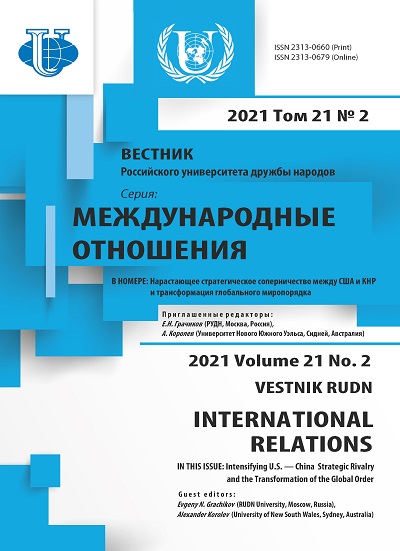Strategies of Sino-American Rivalry in Africa: From 2000 to COVID-19
- 作者: Conteh-Morgan E.1
-
隶属关系:
- University of South Florida
- 期: 卷 21, 编号 2 (2021): Intensifying U.S. — Сhina Strategic Rivalry and the Transformation of the Global Order
- 页面: 265-278
- 栏目: THEMATIC DOSSIER
- URL: https://journals.rudn.ru/international-relations/article/view/26776
- DOI: https://doi.org/10.22363/2313-0660-2021-21-2-265-278
如何引用文章
全文:
详细
In this article it is argued that Sino-American rivalry in Africa is based on competing strategies utilized by each power to enhance their interests and bilateral ties on the continent, as well to try and outdo each other in image projection and overall influence expansion. These strategies of rivalry and power enhancement revolve around promoting close military ties and transactions on the continent; the framing of the continent in the language of securitization and strategic importance; and the perennial utilization of discourse or narrative that frames the other as detrimental to the interests of African states. These strategies of containing the others power preponderance or influence have expanded to include what is now referred to as vaccine diplomacy on the part of China, and during the Trump Administration the raising of loud alarm bells of China trying to dispossess Africa through what could be referred to as the “debt trap”. The consequences of these competing strategies enhance the following: authoritarianism in some key African states; increased jihadism in some regions of Africa as a reaction to the presence of the two major powers on the continent; weapons implicated in state violence and war crimes; and less money available for development as a result of resources being diverted to militarization. The ongoing pandemic will add another dimension to the US - China rivalry as both powers try to project an image of being the most concerned about Africa on as it relates to combating the virus.
作者简介
Earl Conteh-Morgan
University of South Florida
编辑信件的主要联系方式.
Email: conteh@usf.edu
ORCID iD: 0000-0002-5304-1039
PhD in International Relations, Professor of International Studies, School of Interdisciplinary Global Studies
Tampa, Florida, USA参考
- Albrecht, U. (1977). Technology and militarization of Third World countries in theoretical perspectives. Bulletin of Peace Proposals, 8(2), 124-126.
- Alden, C. (2007). China in Africa (African arguments). London: Zed Books.
- Baldwin, D. (1997). The concept of security. Review of International Studies, 23(1), 5-26. https://doi.org/10.1017/S0260210597000053
- Balzacq, T. (2005). Three faces of securitization: Political agency, audience and context. European Journal of International Relations, 11(2), 171-201. https://doi.org/10.1177/1354066105052960
- Buzan, B. (1991). People, states and fear: An agenda for international security studies in the post-Cold War era. Boulder, CO: Lynne Rienner Publishers.
- Cohen, H. (2019). US policy toward Africa: Eight decades of Realpolitik. Boulder, CO: Lynne Rienner Publishers.
- Conteh-Morgan, E., & Weeks, P. (2016). Is China playing a contradictory role in Africa? Security implications of its arms sales and peacekeeping. Global Security and Intelligence Studies, 2(1), 81-102. https://doi.org/10.18278/gsis.2.1.6
- Gelot, L., & Sandor, A. (2019). African security and global militarism. Conflict, Security and Development, 19(6), 521-542. https://doi.org/10.1080/14678802.2019.1688959
- Hong, Z. (2008). China - U.S. oil rivalry in Africa. The Copenhagen Journal of Asian Studies, 26(2), 97-119. https://doi.org/10.22439/cjas.v26i2.2240
- Keenan, J. (2008). US militarization in Africa: What anthropologists should know about AFRICOM. Anthropology Today, 24(5), 16-20. https://doi.org/10.1111/j.1467-8322.2008.00613.x
- Luckham, R. (1994). The military, militarization and democratization in Africa: A survey of literature and issues. African Studies Review, 37(2), 13-75. https://doi.org/10.2307/524766
- Mazrui, A.A. (1986). Africa: A triple heritage. London: BBC Books.
- Mitzen, J. (2006). Ontological security in world politics: State identity and the security dilemma. European Journal of International Relations, 12(3), 341-370. https://doi.org/10.1177/1354066106067346
- Nsia-Pepra, K. (2014). Militarization of U.S. foreign policy in Africa: Strategic gain or backlash? Military Review, 94(1), 50-58.
- Sautman, B., & Hairong, Y. (2013). Friends and interests: China’s distinctive links with Africa. African Studies Review, 50(3), 75-114. https://doi.org/10.1353/arw.2008.0014
- Shinn, D., & Eisenman, J. (2012). China and Africa: A century of engagement. Philadelphia: University of Pennsylvania Press.
- Smith, S. (2005). The contested concepts of security. In K. Booth (Eds.), Critical security studies and world politics (pp. 27-62). Boulder, CO: Lynne Rienner Publishers.
- Waever, O. (1995). Securitization and desecuritization. In R.D. Lipschultz (Eds.), On security (pp. 46-86). New York: Colombia University Press.
- Wendt, A., & Barnett, M. (1993). Dependent state formation and Third World militarization. Review of International Studies, 19(4), 321-347.
- Williams, M. (2003). Words, images, enemies: Securitization and international politics. International Studies Quarterly, 47(4), 511-531. Retrieved from https://studylib.net/doc/8230405/words--images--enemies--securitization-and-international-...








